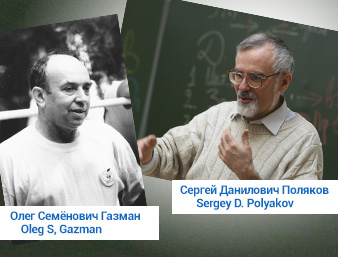
Prerequisites for a pedagogical support concept in the research and practice of Oleg Gazman
Mikhaylova. Nina N.
[about], Polyakov, Sergey D.
[about]
Oleg Semenovich Gazman (1936-1996) is one of the most prominent Russian researchers and experts in the sphere of the personality-oriented education in the 1980-1990s.
Gazman graduated from Novosibirsk Pedagogical Institute, a well-known Russian school of education, which trained such renowned scholars and researchers as N.P. Anikeeva, E.N. Goryukhina, and S.A. Shmakhov. Oleg Gazman belonged to this group. A significant part of Gazman’s research career was his work on the dissertation supervised by L.I. Novikova. She introduced many new names and trained a great number of gifted and well-known scholars, who made an enormous contribution to the Russian social education theory and practice. As is well-known now, L.I. Novikova headed a research team focusing on the problems of the collective and personality including opportunities of an individual’s development in a group and in conflict situations between an individual and the group.
Later, in the 1990s, Gazman considered the aforementioned problems to be some kind of a source in developing his ideas of an individual ability for freedom, which is understood as a an ability to make an intentional and responsible step away from the imposed beliefs and attitudes, into the zone of the so-called moral choice. Gazman’s primary interests correlated with historical and educational issues, a research of the collective as a subject of social education, and the development of a game theory within the theoretical education boundaries. Gradually, all those ideas helped Gazman develop his own original concept of ‘a pedagogical support’ [1,2]. This concept, developed by Gazman in the 1990s, proved a major theoretical and practical achievement as well as the discussion site in the new (Russian) education reality.
Sergey Danilovich Polyakov: A Personality, a scholar, a teacher
Shustova, Inna Yu.
[about], Averyanov, Petr G.
[about]
Sergey Danilovich Polyakov is an educator and a psychologist, professor, with a PhD and a postdoctoral degree in education. He was born on August 18, 1946 in the town of Stupino, Moscow province. A graduate of the Moscow State Pedagogical Institute named after Lenin (1969), Polyakov worked as a schoolteacher in Yakutia, in Ulyanovsk province, Ulyanovsk, and Moscow. He got his PhD at the General Problems of Social Education Research Institute of the Academy of Pedagogical Sciences (Moscow, 1977). Polyakov belongs to the research school founded by the late Dr. Ludmilla Novikova, a member of the Russian Academy of Education. Since 1981, he has been teaching at Ulyanovsk State Pedagogical University (UlGPU), where Polyakov founded a research school and a graduate program in education. He is involved in research in psychology and social education, and in an educational innovation theory. In 1994, Polyakov defended his postdoctorate thesis entitled Foundations of social education innovation theory (Institute of Theoretical Pedagogy and International Research of the Russian Academy of Education, Moscow). He has over 200 research publications in such journals as Pedagogy, Public Education, New Educational Values, Issues of Social Education, Issues of Psychology, World of Psychology, School Principal, Homeroom Teacher, etc., as well as 15 monographs (including Social Education Technologies (Moscow, 2002), Psycho-pedagogy of Social Education and Teaching (Moscow, 2004), Realistic Social Education (Moscow, 2004), Pedagogical innovation theory: from an idea to practice (Moscow, 2007), Collective creative social education: reloading (Moscow, 2015) and others. Since 2001 Polyakov has been head of the UlGPU Dissertation Council in Education. 17 PhD dissertations have been successfully completed under his supervision.




